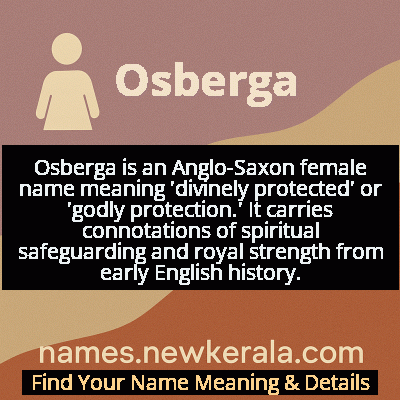Osberga Name Meaning & Details
Origin, Popularity, Numerology Analysis & Name Meaning of Osberga
Discover the origin, meaning, and cultural significance of the name OSBERGA. Delve into its historical roots and explore the lasting impact it has had on communities and traditions.
Name
Osberga
Gender
Female
Origin
Anglo
Lucky Number
4
Meaning of the Name - Osberga
Osberga is an Anglo-Saxon female name meaning 'divinely protected' or 'godly protection.' It carries connotations of spiritual safeguarding and royal strength from early English history.
Osberga - Complete Numerology Analysis
Your Numerology Number
Based on Pythagorean Numerology System
Ruling Planet
Uranus (Rahu)
Positive Nature
Strong sense of order, loyal, practical, and disciplined.
Negative Traits
Stubborn, overly serious, rigid, and prone to feeling restricted.
Lucky Colours
Blue, gray.
Lucky Days
Saturday.
Lucky Stones
Blue sapphire.
Harmony Numbers
1, 7, 8.
Best Suited Professions
Managers, engineers, accountants, organizers.
What People Like About You
Dependability, discipline, practicality.
Famous People Named Osberga
Osberga of Wessex
Anglo-Saxon Queen
Mother of Alfred the Great, influential royal matriarch
Osberga of Mercia
Anglo-Saxon Noblewoman
Founder of religious houses and Christian patron
Saint Osberga
Religious Figure
Abbess renowned for miracles and spiritual leadership
Osberga of Kent
Royal Consort
Diplomatic mediator and peacekeeper between kingdoms
Name Variations & International Equivalents
Click on blue names to explore their detailed meanings. Gray names with will be available soon.
Cultural & Historical Significance
The name's persistence through multiple centuries reflects the stability of certain naming traditions among the Anglo-Saxon elite, even as England underwent dramatic political and religious transformations. Osbergas were typically from the highest echelons of society, often daughters of kings who married into other royal houses, thereby creating and strengthening political alliances. Their documented activities in charter witness lists, religious foundations, and chronicle accounts demonstrate that women bearing this name exercised real authority in both secular and ecclesiastical spheres, challenging modern assumptions about gender roles in early medieval Europe.
Extended Personality Analysis
Women named Osberga are traditionally associated with strong leadership qualities, practical wisdom, and steadfast loyalty to family and community. Historical accounts suggest they possessed a blend of diplomatic skill and inner resilience, capable of navigating complex political landscapes while maintaining personal integrity. These women typically demonstrated remarkable adaptability, balancing traditional Germanic values of honor and kinship with Christian virtues of charity and piety, making them effective mediators in both secular and religious contexts.
The Osberga personality is characterized by a quiet determination and strategic thinking, often working behind the scenes to achieve important goals. They tend to be perceptive judges of character with excellent organizational abilities, making them natural administrators and counselors. While not seeking the spotlight, Osbergas typically command respect through their competence, reliability, and unwavering commitment to their responsibilities. Their strength lies in their ability to persevere through adversity while maintaining grace under pressure, embodying the ideal of the steadfast matriarch who ensures stability during turbulent times.
Modern Usage & Popularity
In contemporary times, Osberga remains an exceptionally rare name, primarily used by families with strong interests in Anglo-Saxon history or those seeking unique historical names with royal connections. The name sees occasional revival among historical reenactors, medieval enthusiasts, and in academic circles studying early English history. While not appearing in modern birth registries with any frequency, it maintains a niche appeal for parents wanting a name that combines ancient heritage with distinctive character. The variant Osburga is slightly more common in historical fiction and genealogical research, but both forms remain outside mainstream naming trends, preserving their authentic medieval quality.
Symbolic & Spiritual Meanings
Symbolically, Osberga represents divine protection, ancestral strength, and cultural continuity. The name evokes images of fortress-like stability and spiritual guardianship, reflecting its etymological roots in divine safeguarding. It carries connotations of bridge-building between traditions—pagan and Christian, warrior and peacemaker, past and future. The name symbolizes the often-overlooked power of women as preservers of culture and lineage during times of upheaval, serving as a reminder that strength can manifest as quiet endurance rather than overt dominance. Osberga embodies the concept of rootedness in tradition while adapting to changing circumstances, making it a powerful symbolic representation of cultural resilience.

